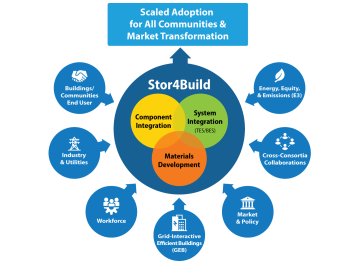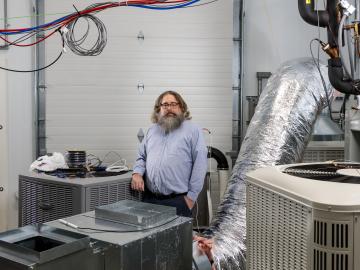Filter News
Area of Research
News Topics
- (-) Buildings (4)
- 3-D Printing/Advanced Manufacturing (2)
- Artificial Intelligence (4)
- Big Data (4)
- Bioenergy (13)
- Biology (16)
- Biomedical (3)
- Biotechnology (2)
- Chemical Sciences (4)
- Clean Water (2)
- Climate Change (21)
- Composites (1)
- Computer Science (9)
- Coronavirus (3)
- Cybersecurity (3)
- Decarbonization (14)
- Energy Storage (2)
- Environment (25)
- Exascale Computing (3)
- Frontier (4)
- Fusion (4)
- Grid (2)
- High-Performance Computing (7)
- Hydropower (3)
- Isotopes (1)
- ITER (1)
- Machine Learning (4)
- Materials (8)
- Materials Science (4)
- Mercury (1)
- Microscopy (7)
- Nanotechnology (3)
- National Security (7)
- Net Zero (2)
- Neutron Science (3)
- Nuclear Energy (3)
- Partnerships (1)
- Physics (2)
- Polymers (1)
- Quantum Computing (5)
- Quantum Science (3)
- Security (2)
- Simulation (3)
- Summit (4)
- Sustainable Energy (13)
- Transportation (3)
Media Contacts

Stor4Build is a new consortium focused on energy storage for buildings that will accelerate the growth, optimization and deployment of storage technologies.

Materials scientist Denise Antunes da Silva researches ways to reduce concrete’s embodied carbon in the Sustainable Building Materials Laboratory at ORNL, a research space dedicated to studying environmentally friendly building materials. Credit: ORNL, U.S. Dept. of Energy

Every day, hundreds of thousands of commuters across the country travel from houses, apartments and other residential spaces to commercial buildings — from offices and schools to gyms and grocery stores.

When Brian Fricke walks into a supermarket, evidence of his scientific achievement is all around in the refrigerated cases housing the fresh fruits and vegetables. As an Oak Ridge National Laboratory building equipment researcher, Fricke has a long history of making sure that produce is kept fresh in an energy efficient and environmentally sound manner.




